Peter MALONE
Saturday, 09 October 2021 13:01
Dangerous Passage
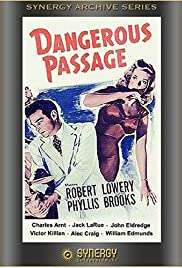
DANGEROUS PASSAGE
US, 1944, 60 minutes, Black-and-white.
Robert Lowery, Phyllis Brooks, Charles Arnt, Jack La Rue, John Eldredge, Alec Craig.
Directed by William Berke.
A slight supporting feature from 1944, with no reference to World War II. The passage in question is from Honduras to Galveston Texas. Robert Lowery plays a young man who is informed that he is to receive an inheritance in Galveston. He is attacked and decides to avoid the expected boat trip and sail on what is described as a bucket. He is befriended by the steward and pays his way.
In the background is his smiling crooked lawyer who has set him up and who later joins the ship with something of a lookalike so that the man can be got rid of and the substitute inherit the money. There is also a problem with the ship, the company which owns it being involved with fraud schemes, crashing the boat on rocks, the crew escaping, getting the insurance. And the ship does crash on the rocks but the survivors are rescued.
There is also a dancer, Phyllis Brooks, who is wanting to get back to the United States and a new way of life – needless to say, instant romance.
The steward is murdered – and the dancer reveals that he was an undercover agent to expose the fraud and she was his associate.
The smallest of budgets, not particularly well made – a time passer.
Published in Movie Reviews
Published in
Movie Reviews
Saturday, 09 October 2021 13:01
Taverna, La
.jpg)
THE TAVERNA
Australia, 2019, 86 minutes, Colour.
Vangelis Mourikis, Rachel Kamath, Senol Mat, Emily O' Brien- Brown, Emmanuela Costaras, Tottie Goldsmith, Salman Arif, Peter Paltos, Maria Mercedes, Christian Charisiou.
Directed by Alkinos Tsilimidos.
A night at the Tavern. The Greek Taverna. And, where is the Taverna? In Melbourne, which has one of the largest Greek populations in the world. But, this is Melbourne and not everyone that works at the taverna is Greek. There is a Turk. There are two with Indian backgrounds. And there are some Melbourne locals. The touch of cosmopolitan Melbourne.
On the whole, this is a very cheerful film though most of the characters are not without their problems. Rather, it is a couple of the customers who are not pleasant.
We arrive with the owner, Kostas (veteran Greek actor, Vangelis Mourikis). He opens up the kitchen to begin the night proceedings. And, 80 minutes or so later, we close up with him, quite the wiser and a little more sympathetic about the human problems that need solving.
Kostas is a good man, a kind man. He has a loving wife, Helen (Maria Mercedes). They are both concerned about their ice-addict architect son, indulging him in cash, prepared to take blame for his selfish and careless behaviour. On the staff is Katarina, in love with the son, but very clearheaded about how his situation should be dealt with, especially by his parents. There is a young in worker in the kitchen who does have problems with his work visa. Sally, Emily O’Brien-? Brown, one of the producers of the film) is earnest, the touch of the perfectionist, but completely devoted to her lazy partner – and Katarina has some good advice for her as well.
The chef is an old Turk, who lost his wife and family long since and is still grieving. He is a good friend to everyone. But, on this particular night, it is belly dancer night. Jamila is the dancer – and does charm all the patrons, many turning up because it is belly dancer night. And, if the other members of staff have problems, Jamila much more so – alienate it from her womanising husband, a restraining order against her and his new girlfriend (both of whom turn up at the restaurant), custody issues about the young daughter.
In a way, these are the ingredients of soap opera. But, the characters are engaging and draw our emotional response. There is humour, a touch of good-willed violence, in Sally getting the opportunity to do a belly dance, some thuggish customers who claim to be restaurant judges, even a visit from the police.
While there is coarse language, not as much in so many other films, the Taverna has been given an MA certificate because of the language.
The writer-director is Alkinos Tsilimidos who, unfortunately, has not made many films – the drama Every Night, Every Night, was his earliest film and he directed a finely observed film about city life, Tom White (2004) with Colin Friels.
So, a night out at the Greek Taverna.
1. The title? The Greek restaurant? In the Melbourne Street? The audience spending one night there with the staff and their problems, with the customers?
2. Kostas arriving and opening up, the setting up of the kitchen with the chef, the staff, the night with the belly dancer, her arriving and getting ready, the dance and the customers? The further complications with each of the staff members? And the film ending with Kostas closing the restaurant?
3. The tone of the film, warmth, problems, audience sympathy?
4. Kostas, his age, experience, manner, kind-hearted? With each of the staff? The kitchen, rallying the audiences, introducing the belly dancer, handling the crisis and the next belly dancer, his friend and the irony of her coming with the belly dancer’s husband, emotional tangles, her disappearance, the genial customers, response to the dance, the ocker customers and their demands, food critics on the Internet? His wife, her concern, his drug-addicted son, willing to take the blame for the hit run accident?
5. Jamila, her story, her background, alienated from her husband, her daughter, the restraining order with Rebecca? And need for money? Her dance and success? Her husband arriving, antagonism towards Rebecca? Unwilling to do the dance? Training Sally? Sally’s success, giving her the tips? Eventually confronting her husband? Resolving the issues, the separation?
6. Sally, genial, working with the staff, serving the customers, wanting to be an actress, the possibility for the belly dancing, Jamila training her, her perfectionist ambitions, the performance, the goal of tormenting Rebecca on behalf of Jamila? The customers? The ocker man touching her, her response, the young men and the fight starting? The conversations with Katarina, her relationship with Frank and his laziness, her following Katarina’s advice in getting him to get his own meal?
7. Katarina, the Greek background, her work, with the customers? Her past relationship with Kostas’ son? Separation? Still loving him? Giving Kostas good advice about not giving his son money, being stern with him, getting him to stand on his own feet? Her good advice to Sally about her partner?
8. The young Indian man, photos, his work, the difficulties with his working visa?
9. The chef, the Turkish background, losing his wife and children, his continued grief, at work, kindly? His abducting Rebecca and locking her in the van? The problem with the possums? The ocker group and his making the souvlaki with possum meat?
10. Jamila’s husband, smug, womanising, a roving eye, dancing with Sally? Rebecca’s reaction, her family background, wealthy? Walking out, her insulting the chef, his abducting her, tying her up and putting her in the van? Her eventual reappearance, upset? The husband, his concern, continued phone calls? His final sitting and talking with Jamila?
11. The customers, eager for the belly dancer, the tips, the men dancing, the youngsters in their excitement, the ockers, lounging, their demands, the threat about their online criticism, to close down the restaurant, their enjoying the souvlaki possum?
12. Kostas, the visit of his son, his giving and the money, his son’s architectural ambitions, ice-addiction, the accident, his leaving, his mother’s arrival, the plan for Kostas to take the blame, that he was driving, Katarina’s advice, the police and the interrogation, his admitting that his son was driving?
13. A cross-section of human problems in the context of a night at the restaurant?
Published in Movie Reviews
Published in
Movie Reviews
Saturday, 09 October 2021 13:01
Take Me
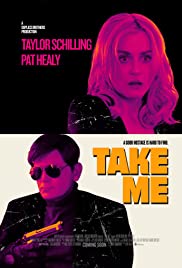
TAKE ME
US, 2017, 93 minutes, Colour.
Pat Healy, Taylor Schilling.
Directed by Pat Healy.
The title refers to abductions. Comedian Pat Healey, who wrote and directed the film, plays a middle-aged man whose profession is abductions. On his wall at home are photos of his successes, paid for abductions, some people wanting to change their lives, others wanting thrills. The film fills in something of his background, a loser, separated from his wife, strained relationship with his sister and her family.
The film illustrates his profession by showing him abducting a large man and tormenting him by stuffing burgers into his mouth – an abduction therapy which, at the end of the film, has proven to be successful.
The main part of the film concerns a professional businesswoman (Taylor Schilling) who has booked a weekends abduction, paying a substantial sum. When she is abducted, it seems that it might be the wrong woman – and, what follows is a weekend of torment for the woman, of the possibility of a mistake, ultimately a reversal of roles, the woman actually being better creating a scenario in following it through than the abductor.
The film is produced by the Duplass brothers – and is in the vein of many of their low-key, small budget, oddball comedy films.
1. The title? abductions? Ray and his profession? Idea? Execution ideas?
2. The plausibility of the plot? The abduction profession? Carrying it out? Issues of crime, psychology, police?
3. The setting, Ray and his house, his visit to his sisters? The abduction, the fat man and his junk food, Anna and her capture, the interiors of the house? The musical score?
4. The portrait of Ray, age, appearance, awkward, wig? The stalking of the fat man, the abduction, the torture, the burgers? Letting him out, the warning? The audience discovering that this was a professional job? (And the satisfaction at the end of the fat man eating his salads and thanking Ray?)
5. Ray’s background, his wife, the separation? Reasons? On his own? The visit to his sister, the kids, the brother-in-law? Money? His sister later visiting him and seeing and are abducted?
6. The message from Anna, the tone on the phone, his checking the Internet? Her plan, the money deposit?
7. The abduction, the treatment of Anna, in the car, the boot, in the house, tied up? The interactions? Her violent resistance? No food? His reactions? Ray’s sister seeing her?
8. Audience sympathies? With Ray and his trying to do his job? With Anna and her experience of abduction, going to give the talk, the TV and her disappearance, the police investigations and visit? Not eating, the violence? Her acting as if she had not organised the abduction?
9. The shift of mood? Anna taunting Ray, his wig? His becoming desperate? Believing that he had the wrong woman? His treatment of her? The further shift with her revelation
that she had organised the abduction? What she wanted out of it? Her skill in acting the scenario compared with his skills? Turning the tables on him? On the roof of the building?
10. Ray, as a loser, his hopes, his being taunted by Anna about his wife, his family? His future?
Published in Movie Reviews
Published in
Movie Reviews
Saturday, 09 October 2021 13:01
Day of the Devil, The
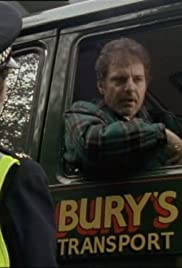
THE DAY OF THE DEVIL
UK, 1993, 101 minutes, Colour.
John Thaw, Kevin Whately, Keith Allen, Harriet Walter, Richard Griffiths, James Grout, Patrick Drury, Michael Culver, Gilly Coman, Gavin Richards, Katrina Levon.
Directed by Stephen Whitaker.
This episode is one of the later films amongst the 33 adaptation of Colin Dexter’s novels with John Thaw as Morse, working in Oxford, with Kevin Whately as Lewis, his sergeant. It is not so much a murder mystery to be solved but rather the escape of the criminal from an institution, the search for him, the implications of the search and his crimes.
John Thaw, as always, is very effective as Morse, very serious, brusque in manner, demanding on Lewis, not suffering fools gladly but having to submit to the orders of Chief Superintendent Strong. And, as always, there is his love for classical music.
This particular episode has a very strong supporting cast. Richard Griffiths appears as Canon Appleton, an expert on the occult, conducting Brahms with an ensemble that he is training (and this performance precedes Pie in the Sky). Longtime character actress, Harriet Walter, has an early role as the psychiatrist working at the institution, key to the plot. However, Keith Allen is excellent, quietly menacing as the Satanist, criminal, John Barrie, with sex offences and violence.
This is a great deal of discussion about the occult and a sequence of a Black Mass in the forest on August 1, Lamis Day.
There are quite some complications, especially with Barrie able to change his appearance and manner, effect an abduction, commit a murder during the Black Mass, ultimately fall foul of the person whom he trusted and the revelation that she was out to get revenge on him and his partner.
One of the more striking episodes in the Morse series.
1. The popularity of the Inspector Morse films? The novels by Colin Dexter? Police investigations, mysteries? Morse and Lewis working together? Chief Superintendent Strong
2. The Oxford settings, the city itself, streets, the surrounding countryside? Police precincts? The University? Bookshops? The institution? Hotels? The houses in the countryside, interiors? The musical score? Morse and classic music? The Canon and his conducting the Brahms?
3. The background of the cult, Morse and Lewis and their being completely sceptical? Barrie, his considering himself the disciple of Satan? Signs and symbols? In the institution? His room and the illustrations? His writing the book? Esther and her working with him, understanding his mentality, indicating that she was a medium? The gradual revelation of his crimes, sexual crimes, his arrest, imprisonment? In the institution? His escape, drugging the guard, his being in the theatrical group and having the make up equipment, dying his hair, later his wigs, beard, female dress? The keys, walking out of the institution, getting the lift on the truck? Contacting Appleton? Watching the press interview with Morse? Going to the estate agent, renting the house? The attack on Holly, the abduction, confining her to the house? His continued changing his appearance? The waitress recognising his tattoo and phoning the police? The phone calls and as telling Morse he had made a mistake? Lamis Day? The ritual in the forest, the fire, his appearing as the Devil, his murdering Trevers? The threats to Esther? Conversation with the man at the railway station, his going abroad, Barrie going to his home? His confronting Holly, wanting the souvenirs from the attacks on the women? Her shooting him? Going to the house, Esther coming to him, the threats, dealing with him, his coming out, attempting to shoot Morse, no bullets in the gun, the police officer who guarded Esther shooting him?
4. Morse, his character, brusque, serious? Intense on his job? Interactions with Strong, the rules, Strong making demands? Lewis, his character, the investigations, the interrogations, going to the occult shop and the interactions with the owner? The meetings with Holly Trevers, hospital? Her later going to Morse after shooting Barrie? At the University, the Bursar, Trevers and his doing the job? The later revelation with the lawyer, and their all being part of the cult group?
5. The Canon, the article in Barrie’s file, conducting the choir, his knowledge, the discussions with Morse, Barrie and his confronting him?
6. Esther, her work at the hospital, her family background, the three brothers, the motorbike? Her getting the job on merit, working with Barrie? Morse and the interrogation, his disdain for the head of the institution, laxity, freedoms, his disdain for Esther? The threats to her? Putting her in the hotel? Getting to know her better? Her character, experience, concern, explanations of her therapy? The young officer put to guard her? The conversation with Morse – and the intensity about feminism, feminine qualities, weakness, and Morse apologising? The young woman insulted? But her later shooting Barrie?
7. The range of supporting characters, Trevers and his work, his brutality towards his wife, her submission? The Bursar, his attorney, their cult interests? The owner of the bookshop and his phone call?
8. The visualising the cult, the Black Mass, in the forest, the fires, the fear, the murder? The Canon and his visiting the site, the explanations? The Bursar, his leadership the Black Mass and his subsequent fears?
9. Esther, her ring among the trophy jewellery, her being the first victim, her plan, carrying it out, infiltrating into Barrie’s good books, helping him after his escape, the setting up of Trevers to be killed, for Barrie’s death – and her comment to Morse to look into the eyes of the other victims and know how she felt.
Published in Movie Reviews
Published in
Movie Reviews
Saturday, 09 October 2021 13:01
Five, 2016
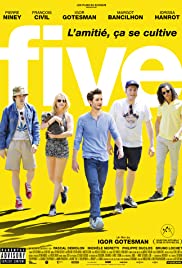
FIVE
France, 2016, 102 minutes, Colour.
Pierre Niney, François Civil, Igor Gottesman, Margot Bancilhon, Idrissa Hanrot, Michelle Moretti, Philippe Duclos.
Directed by Igor Gotesman,
This is a film for 20 somethings. Older audiences might share the attitude of the father of the central character, disgust at his deceptions, cutting him off financially and emotionally. But, the rather carefree attitudes of the central characters – and their having to care a great deal about their day-to-day living, financial situation, emotions.
Pierre Linney, who appeared as Yves St Laurent (and won a Cesar award for his performance) is a wealthy young man, studying medicine because his father wishes it and pays for it, but actually wanting to be an actor, going to rehearsals, coached and supported by a sympathetic older woman, attracted to one of his fellow actors.
He has some lifelong friends. One is Tim, a great chef, cheerful but irresponsible. On the other hand there is Vadim, played by the director/writer Igor Gotesman), fairly ordinary, but secretly in love and in relationship with their friend, Julia. The fifth in the group is Nestor, a serial womaniser.
Younger audiences may identify with them in reality or in some wishful thinking! Older audiences may well be irritated. The rich young man, Sam, is able to negotiate an apartment where the five of them can live. But, almost immediately, his father discovers the truth about his not being a doctor, cuts him off. While he does get some money from his friends to pay the rent, he has promised to pay the difference. There are all kinds of schemes and jobs he takes up, car delivery at a hotel, shops… However, he is introduced by Tim to a drug dealer and they undertake a huge amount for sale. Sam loses money on horses. Several people to whom they would sell the drugs, including the old lady at drama school who dies.
They also cater for a party and hope to sell the drugs but the womaniser goes to bed with the 20-year-old whose birthday is being celebrated and everybody is hounded out of the party. Further complications – and have they learned their lessons? The smart move of the others is to denounce the drug dealers to the police and have them arrested so that the debt does not have to be paid. In the meantime, the old lady has given a painting to Sam – and everybody dislikes it. At her death, she sends a message and, of course, there is a wad of cash hidden at the back of the painting.
The film opened on an island in Thailand and ends there, the five of them going to live there in an idyllic paradise setting! Some dreaming wishful thinking.
Published in Movie Reviews
Published in
Movie Reviews
Saturday, 09 October 2021 13:01
Brio, Le
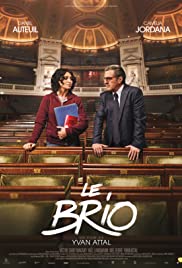
LE BRIO
France, 2017, 95 minutes, Colour.
Daniel Auteuil, Camelia Jordana, Yasin Houicha, Nozha Khouadra, Nicholas Vaude, Jean- Baptiste Lafarge.
Directed by Yvan Attal.
A very strong French drama, principally in its interaction between its two central characters, a rather smug and obnoxious academic, played by Daniel Auteuil, and a young law student, Camelia Jordana, whom he challenges and insults publicly during a lecture. He is asked by the President of the University to take on the student and train her to participate in a public speaking competition so that he avoids being stood down from the University because of his behaviour.
The film does not give much background to the Professor except for a visit to his senile and angry mother. However, it fills in the background of the young woman, her mother and grandmother, living in a poorer suburb of Paris, her friends from the past, especially one with whom she is in love.
The bulk of the film shows the sessions between the academic and the young woman, the nature of the training, her becoming more articulate, learning of the different ways to manage debating, her eventually becoming more expert, even with an episode in the metro where she has to declaim Shakespeare’s Julius Caesar to the passengers. In her first stage, she loses her calmness when she is insulted by her opponent. However, she gains control, goes into various rounds of the debate and wins them. But, at the time of the final, she discovers that the academic is on probation for his position and she declares that she is unwilling to be a foil for him. However, her boyfriend provides common sense, challenges her and she goes to the board meeting, is able to use all her acquired talent for debate and argument, for and against him. He follows her and is grateful.
The prologue of the film is a series of interviews with authors with views on the relationship between words and objects. The film is very strong on the nature, articulation and delivery of words.
And, while there seems happy ending, there is a fine postscript where the young woman interviews an insolent young man whom she is about to defend in court – and her strong demands on him, her self-confidence for her future.
1. The title? Contest and upset?
2. A French production, the city, trains, the streets, the atmosphere of Paris? The University, the interiors? The poorer suburbs, homes? Cross-section of Paris? The visits to the cities? The musical score?
3. The introduction, the interviews with celebrated writers, the comments on words, ideas – and how this continued throughout the film, the value of words, articulation, pronunciation, clarity? In speechmaking? In debate? The listing of the principles for debate, for meaning, for persuasion? Not necessarily for expressing the truth?
4. The introduction to Neila, on the train, the music, being late, at the University, Pierre confronting her publicly in front of the class, the interactions, insults, racist innuendo, the reaction of the class? Its being videoed? Pierre called before the President of the University? His being on trial? The president announcing the speech competition? His suggesting that Pierre train Neila as part of his redemption and not losing his job?
5. Neila, her background, her mother, scenes at home, her grandmother, traditional dress, the meals, criticising her daughter for not marrying? The young people, Neila and her friendship, knowing Mounir for so long, taunting him, loving him, the night together, his criticisms of her, her changing? And finally reunited?
6. Neila, studying law, her ambitions, her reaction Pierre’s attack, her return, the appointment in the classroom, the initial interactions, hostility, the development over the weeks, his aim for her to win the competition?
7. The detail of the sessions, clarity of speech, on the desk, declaiming, slowing down in delivery? On the train, declaiming Shakespeare, the reactions? Pierre and his speech, getting the tip from the old lady? The reaction of people on the train, that she sounded like Lord of the Rings? The musicians?
8. Debate techniques, the various rules and strategies, her illustrating each of them, from tentative to definite?
9. The visit to the home for the elderly, Pierre’s cranky mother?
10. The first debate, clothes making the man…? Her opponent, well-dressed, slick, his speech, his taunts? Her speech, insulted, attacking him, the poor speech, Pierre’s reaction?
11. The development, the training, the further debates, the continued success? Victories?
12. Benjamin, her disdain, talking with him, his own career, his revealing the situation about the president getting Pierre to redeem himself by working with her?
13. The staying at home, not wanting to help him? The discussion with Mounir, his making her see sense about what she had done, the futility of giving up? Her arrival, everybody gone? Going to the board meeting, insisting on speaking, using all the techniques of her training to explain Pierre, praising him, criticising him, persuading the board? His following
her, his gratitude?
14. The postscript to the film, as a lawyer, the interview with the young man, his surly reactions, her standing her ground, insisting? Her sense of achievement – and her future?
Published in Movie Reviews
Published in
Movie Reviews
Saturday, 09 October 2021 13:01
Agatha Christie's Poirot Appointment with Death
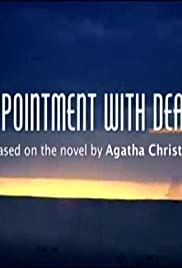
APPOINTMENT WITH DEATH
UK, 2010, 93 minutes, Colour.
David Suchet, Tim Curry, John Hannah, Elizabeth Mc Govern, Christina Cole, Tom Riley, Cheryl Campbell, Zoe Boyle, Emma Cuniffe, Angela Pleasance, Paul Freeman, Beth Goddard, Christian Mc Kay, Mark Gattis.
Directed by Ashley Pearce.
This is one of the later films in the television series of adaptations of Agatha Christie mysteries with David Suchet as Poirot. Devotees of Agatha Christie and her novels were very much dissatisfied by this adaptation, some key characters omitted, other characters introduced as well as themes that were not in the original. They recommend the adaptation with Peter Ustinov as Poirot.
The setting is Syria, 1937, an archaeologist searching for the head of John the Baptist (neglecting that there were already three claimants including one in the mosque in Damascus!). He has an impossibly arrogant wife who is murdered. Poirot is present, accompanies the group to the dig at an exposition to view the terrain. There is quite a range of characters, Lord Boynton son (played by Mark Gattis who was to adapt number of murder mysteries for the screen, especially Sherlock), three of Lady Boynton’s adopted children, a young visiting doctor, a doctor who had given testimony in a case that Poirot had been involved in, an encounter with a travel writer who joins the expedition. There is the nanny of the children and a mysterious Polish nun, in full habit. There is also a colonel who investigates the case and is soon revealed to be investigating a white slave trade. There is also a mysterious American who has a key role.
The action takes place over 24 hours, the death of Lady Boynton, Poirot investigating and interrogating, a variety of reactions, the assembly of everyone at the dig, and the explanation of the complexities of what it happened.
Probably very enjoyable for those who have not read the novel. More than irritating for those who wanted a faithful version of the novel.
1. The popularity of Agatha Christie mysteries, the television series, David Suchet as Poirot? This version receiving very negative comments, changes from the original novel, permission of characters, addition of new characters and themes?
2. The Syrian setting, archaeological digs, the search for head of John the Baptist? The city, hotels? The landscapes? The musical score?
3. The title, ancient traditions, appointment in Samara, with death?
4. The setting, Lord Boynton, his archaeological searches, the collapsing sand, the finding of the subterranean room, the narrative and story? Those working on the dig with him?
5. In the city, the range of characters assembled, the introduction to each, their going out to the dig, the expedition, the death, the investigation, the intricacies, Poirot’s investigation, the revelation?
6. Lady Boynton, her arrogant manner, dismissive? Her adopted children? The flashbacks to her cruelty, the beatings by the nanny? The nanny present? Raymond, his being put down by his mother? Carol and her having to do menial tasks for her mother? Jinny, the youngest, humiliated? Lady Boynton and her background, the United States, finance, her wealthy company?
7. Poirot present, observing, Colonel Carbury, English, not of the police, his investigating the case, collaboration with Poirot, the revelation of his mission about the white slave trade?
8. The Polish nun, incongruous, in full habit, her attention to Jinny? The attack and her being wounded? The revelation of her role in white slavery? Her hypocrisy? At the end, the car breaking down in the desert?
9. Sarah, fainting and the heat, Raymond and his attentions, his reticence, not introducing his mother? Her being a doctor? Helping Dr Gerard? Happy ending for her?
10. The dramatic arrival of Cecilia, her reputation as a travel writer? Discussions with Poirot? Helping with Lady Boynton?
11. Jefferson Cope, the American, his manner, the issue of the newspapers, the mystery of his presence, his telling Poirot about his financial collapse – and the revelation of who he was, with Lady Boynton, undermining her financial Empire?
12. Leonard Boynton, his arrival, dislike of his stepmother, wanting his father’s tension, working on the dig, upset with Poirot?
13. The expedition, the heat, Dr Gerard collapsing, his return, Jinny and her affection?
14. Lady Boynton, not travelling, sitting watching, the episode of the bee sting, her collapse, her husband finding her, his devotion to her, the blood on his hands?
15. The nanny, the flashbacks, her cruelty? On the bed, Dr Gerard and his attentions? Drowning herself in the bath?
16. The complexity of the plot? Lord Boynton and his looking down on Poirot? Finding the head of John the Baptist – the tooth, his son fabricating the head? To undermine his father’s years of neglecting his family for his work?
17. The truth about the colonel, the white slave trade, the nun exposed, her targeting Jinny?
18. The revelation about Jefferson Cope, Lady Boynton, testing out orphans, rejecting them, the irony that Leslie was a boy, Cope and his financial revenge on Lady Boynton?
19. The documents about Dame Cecilia, being a servant, her pregnancy, the father, going to Ireland? Her denial about the baby, giving it up for adoption? The revelation of the baby was Jinny? Dr Gerard as the father? Their plot to kill Lady Boynton, the poison in the bee sting, her collapse, paralysis, suffering the heat, Cecilia stabbing her? Their love for their
daughter, not regretting what they had done? The doctor poisoning the both with digitalis?
20. The impact of those who have not read the book? Complexity? The satisfaction of the adaptation?
Published in Movie Reviews
Published in
Movie Reviews
Saturday, 09 October 2021 13:01
Catherine the Great/ 2019
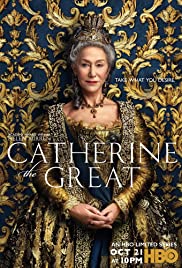
CATHERINE THE GREAT
UK, 2019, 200 minutes, Colour.
Helen Mirren, Jason Clarke, Gina Mc Kee, Richard Roxburgh, Joseph Quinn, Clive Russell, Kevin Mc Nally, Rory Kinnear, Georgina Beedle, Thomas Doherty.
Directed by Philip Martin.
This is a British miniseries quite lavish in production, filmed in Lithuania and on location, capitalising on Russian buildings, palaces, exteriors and interiors, period costumes and decor.
It does not give specific dates but begins in the early part of the 18th century and there is a reference to the French Revolution and the death of Louis XVI by the end, bringing the action into the 1790s.
While Helen Mirren is a powerful screen presence, she was performing in her early 70s, impersonating a much younger woman which tests credibility despite her skills. She had played Queen Elizabeth I, Queen Elizabeth II and a number of regal characters.
Audiences may find some difficulties with other members of the cast, the impact of Jason Clarke as Potemkin, also with his being young, ageing. Richard Roxburgh has a strange accent as the younger Orlov the brother, while Kevin Mc Nally is the older. Rafe Spall is much more successful and consistent as Minister Panin.
The themes are interesting, Catherine herself becoming empress after the death of her husband, with the support of the Orlov brothers, alienated from her son but trying to reconcile with him, finding that he is too weak for her convictions. She is portrayed as having a lust for power as well as a lust for lust, her many liaisons, and her final and long relationship with Potemkin.
The screenplay seems to have parallels between contemporary Russia and Russia in the 18th century, becoming great, progressive, suspicions of relationships with Europe, more interested in expansion to the east and south, especially with Crimea and a port on the Black Sea. And, there is a traditional antagonism with the Turks.
There have been a number of portraits of Catherine the Great on screen, from Elizabeth Berger in the 1930s, Marlene Dietrich as The Scarlet Empress, Tallulah Bankhead as Czarina in the 1940s and Jeanne Moreau as Great Catherine in the late 1960s.
1. Revisiting Russia in the 18th century, the reign of Catherine the Great, her personality and rule, her relationships, politics, Russia with Europe, Russia with the East, the Turks, Crimea?
2. The recreation of the period, buildings and décor, interiors, the splendour? Costumes and decor? The action sequences? The visits to the Black Sea? The musical score?
3. Made for television, the episodes, the cumulative effect? The presence of Helen Mirren? The rest of the cast? The modern perspectives? Language and expression?
4. The parallels with 21st-century Russia, Russia being great, relationship with Europe and tensions, the Soviet empire and collapse, the outreach to the countries of the Empire? The parallels with Vladimir Putin?
5. The portrait of Catherine, Helen Mirren and her age, playing the part of the younger Catherine? Credibility? Her background, from Germany at 15, learning Russian, her marriage, her son and his being taken by her mother-in-law, the strained relationship with her son, her weak husband, the Orlovs and taking the throne, his death, the cousin and his madness, death in prison? Her becoming empress?
6. Catherine and her manner, her relationships with men, with Orlov, not marrying him, his womanising, the clash between them, his brother and his power, their role in deposing the Emperor, the dislike of Potemkin, bashing him? Falling from power, the older brother’s return?
7. The arrival of Potemkin, age and experience, the attraction towards Catherine, the encounter with the Countess, the liaison, her encouraging him with the Empress? His liaisons with women, the attraction to the Empress? Her attraction? Seeking him out, his return to the court, his mimicking her speech to the people? His being accepted? A man of action, the fight against the Turks, his achievement? The return, power, his idea about Crimea? Her hesitations? The passionate relationship? The Orlov brothers and their bashing him? His restlessness, the tension in the relationship? His negotiation with the Tartars, peace, there pledging loyalty, the building of Sebastopol, the port in the Black Sea and Russia’s
greatness? His return, Minister for war, foreign affairs, the siege of the Turkish town? The spies? His letters to Catherine? His death and its impact on her?
8. The Orlov brothers, their power, Catherine’s attitude? Relationships? Falling from power?
9. The Countess, her friendship with Catherine, advice, with Potemkin, her presence through the years?
10. Minister Panin, his continued presence, advice, his relationship with Paul, encouraging him? Catherine dominating him, his policies, over the years, her demanding his resignation?
11. Paul, brought up by his grandmother, angry with his mother, the death of his father, suspicions? The discussions with Panin, his ambition to be Emperor? The marriage, his wife and her affairs, pregnancy, her death and the death of the baby? The impact on him? On Catherine? His sulking, his mother making demands, his marriage to the German Princess? The birth of the son? Catherine has the doting grandmother? Wanting to bring him up, getting him to sign the document of succession? Paul and the foreign troops, his mother sending him to Austria as ambassador? Her death and his reaction to the documents, becoming Emperor?
12. The years passing, Catherine getting older, her liaison with young men at the court? The effect on her, on them?
13. Catherine’s collapse, crowding around her, her death?
14. The portrait of the Empress, her social concern, speech to the Russians, antislavery, her writings? Politics? Her lust for power, her lust for last? Her impact on history?
Published in Movie Reviews
Published in
Movie Reviews
Saturday, 09 October 2021 13:01
My Life as a Zucchini / Ma Vie de Courgette

MY LIFE AS A ZUCCHINI/ MA VIE DE COURGETTE
France, 2016, 70 minutes, Colour.
Directed by Claude Barras.
This is a brief animated film, over 40 prizes and nominations at festivals around the world. It received nominations for Oscar for best animated film, Golden Globe, BAFTA as well is winning awards in France, including the Cesar. It also won this award for its screenplay by Celine Sharma, best known for Lilies, Tomboy, Portrait of a Lady on Fire.
While the style of the animation is quite direct, the plot is rather complex. It focuses on children, trauma in growing up, lives in an institution, hardships as well as a response to affirmation.
The initial focus is on a young boy who goes by the nickname of Zucchini/Courgette. We are shown the difficulties of his life at home, especially the hardships with his mother and her problems. He is rescued and is transferred to an orphanage.
There are various scenes of the orphanage, the interactions with the other children, a friendship with Camille, antagonism with a redhead whose name is Simon. There are hardships with the management of the orphanage, some severity.
However, the agent for allotting children to the orphanage, Raymond, is a sympathetic man who decides then that he will care for Zucchini and taking from the orphanage. He decides also to take Zucchini’s friend, Camille. Simon, with whom Zucchini has had altercations but become friends, accepts the fact that he has been left behind.
The story ends with some hope that some children will have good lives and receive love and affirmation.
Published in Movie Reviews
Published in
Movie Reviews
Saturday, 09 October 2021 13:01
Lost Junction
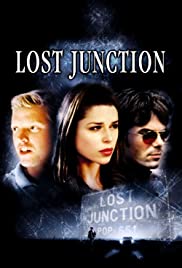
LOST JUNCTION
US, 2001, 95 minutes, Colour.
Neve Campbell, Billy Burke, Jake Busey, Charles Edward Powell, David Gow, Michel Perron.
Directed by Peter Masterson.
Lost Junction has more than a touch of the film noir. A car breaks down on a Highway in the middle of nowhere and a young woman, Missy, pulls up to help. The driver is played by Billy Burke. The woman by Neve Campbell. The audience immediately sees that she has a dead body in the trunk of her car. And she persuades the young man to accompany her to town and back her up in her visits to the bank to withdraw her husband’s money.
There are emotional complications, the audience suspicious about Missy and what she has done. There are also emotional complications with Jimmy – which are revealed later, his blaming himself over causing his friend to be a paraplegic.
The plot is not as straightforward as all that. Missy has had an abortion and has married the doctor. He has been brutal towards her. Eventually, Jimmy with his injured friend turn up to help Missy.
The film was directed by Peter Masterson who directed Geraldine Page in her Oscar-winning performance in The Trip to Bountiful.
1. The title? The small town in the south? The overtones – crossroads, people and travellers being lost?
2. The town, the roads, isolated, homes, shops, diners, police precincts? The contrast with New Orleans? The musical score?
3. Jimmy Mc Gee’s story, on the road, the car breaking down, Missy driving by, her proposition, the audience knowing that the body was in the trunk of the car? His agreeing to Missy, the meal, staying with her, going to the bank and her story about the transplant, meeting the sheriff? Listening to a story about Doc? Not wanting to go to New Orleans? Her persuading him?
4. The later revelation about his story, the friends in the past, the quarry, the drinking, pushing Matt over the cliff? His long apologies and weeping? The disappearance for years? His nightmares about the event?
5. Missy, audience reaction to her, the body in the car? Her wilfulness, her demands, on Jimmy, on the bank manager, withdrawing all her cash?
6. Her not telling the full truth, the eventual emerging of the truth, Doc and his abusiveness, the background of her abortion, the assault by her father, staying with Doc, his brutality, her reaction? The help from Porter? To bury Doc in New Orleans with his first wife as he wished?
7. The complications of lies? In New Orleans, the encounter with Porter, the money, his brutality? Jimmy and his decision to return to Charleston, meeting up with Matt, telling the story, the two returning to New Orleans?
8. The attack on Porter, getting the money, stopping at the diner, the waitress and her story, her interest in Missy and Jimmy, the return, Missy coming into the diner?
9. The return home, the sheriff, the arrest, Jimmy in jail, Porter in jail, Missy in jail? The sheriff, sympathetic?
10. Letting Missy go, the funeral and Porter’s intrusive interruption? The minister hurrying away?
11. The resolution of the case, Missy innocent, Jimmy and love, Matt getting the job with Shorty? The future?
Published in Movie Reviews
Published in
Movie Reviews